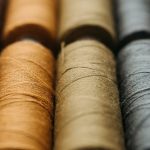You’ll find polypropylene filter fabric made from durable polypropylene fibers that resist chemicals, tearing, and moisture. It’s lightweight yet strong, perfect for filtering water, protecting soil in agriculture, and stabilizing ground in construction projects. Its chemical resistance helps it handle harsh environments without degrading. You’ll also benefit from its cost-effectiveness and long-lasting performance. If you want to understand how it enhances water treatment, agriculture, and civil engineering, keep exploring its versatile roles and maintenance tips.
Table of Contents
Key Takeaways
- Polypropylene filter fabric is a durable thermoplastic material made from fine extruded fibers, offering high tensile strength and chemical resistance.
- It effectively filters suspended solids, oils, and impurities in water treatment and agricultural irrigation systems.
- The fabric resists acids, alkalis, organic solvents, and most chemicals, ensuring longevity in harsh environments.
- Used in construction and civil engineering, it stabilizes soil, prevents erosion, and improves drainage efficiency.
- Maintenance involves regular inspection and cleaning to prevent damage and ensure consistent filtration performance.
Composition and Manufacturing Process of Polypropylene Filter Fabric
Although you mightn’t realize it, polypropylene filter fabric owes its effectiveness to both its unique composition and a carefully controlled manufacturing process.
You’ll find that this fabric is made primarily from polypropylene, a thermoplastic polymer known for its durability and resistance to chemicals. During production, polypropylene pellets are melted and extruded into fine fibers.
These fibers are then laid down in a web-like structure, using techniques such as spunbond or meltblown processes. You’ll appreciate how these methods control fiber diameter and web density, which directly impact the fabric’s filtration efficiency.
Finally, the fabric undergoes bonding—thermal or chemical—to enhance strength and stability without compromising porosity. By understanding this process, you can see why polypropylene filter fabric performs so well across various applications.
Key Physical and Chemical Properties
You’ll want to understand the tensile strength and durability of polypropylene filter fabric to see how it holds up under stress.
Its chemical resistance makes it ideal for harsh environments, while the thermal stability range guarantees it performs well across different temperatures.
Let’s explore these key properties to know why this fabric stands out.
Tensile Strength and Durability
When you evaluate polypropylene filter fabric, its tensile strength and durability stand out as essential factors that determine performance. You’ll find that this fabric resists tearing and stretching under stress, making it reliable for long-term use in various filtration applications. Its durability means it withstands repeated handling and mechanical forces without degrading quickly.
Here’s a quick comparison to help you understand:
| Property | Description |
|---|---|
| Tensile Strength | High resistance to pulling forces |
| Durability | Maintains integrity over time |
| Impact Resistance | Absorbs shocks without damage |
Chemical Resistance Features
Because polypropylene filter fabric interacts with various chemicals during filtration, understanding its chemical resistance is essential.
You’ll find that this fabric resists most acids, alkalis, and solvents, making it ideal for harsh environments. It doesn’t easily degrade when exposed to common substances like bleach, detergents, or oils, so it maintains effectiveness over time.
However, you should avoid strong oxidizing agents like concentrated sulfuric acid or nitric acid, as they can damage the fabric. This resistance helps you use polypropylene filter fabric in water treatment, chemical processing, and industrial filtration without worrying about chemical breakdown.
Knowing these features allows you to select the right filter fabric that withstands your specific application’s chemical exposure while ensuring consistent performance and longevity.
Thermal Stability Range
Although polypropylene filter fabric offers excellent chemical resistance, understanding its thermal stability range is just as essential for ensuring reliable performance.
You’ll find that polypropylene maintains its integrity between -20°C and around 100°C (approximately -4°F to 212°F). This means it handles typical operating temperatures without warping or losing strength.
However, you should avoid exposing it to continuous temperatures above 100°C, as prolonged heat can cause deformation or reduce filtration efficiency.
On the lower end, it remains flexible and functional in cold environments, making it versatile for various applications.
Knowing this thermal window helps you select polypropylene filter fabric for environments where temperature fluctuations occur, ensuring durability and consistent filtration under expected conditions.
Advantages Over Other Filter Fabrics
You’ll find polypropylene filter fabric stands out for its durability compared to other materials, handling wear and tear with ease.
It also offers excellent chemical resistance, making it ideal for harsh environments.
Plus, its cost-effectiveness means you get reliable performance without breaking the budget.
Durability Compared to Alternatives
When you compare polypropylene filter fabric to other materials, its durability stands out clearly. You’ll find it holds up better under stress and lasts longer, making it a smart choice for demanding applications.
Here’s why its durability beats alternatives:
- High tensile strength – It resists tearing and stretching, maintaining integrity under pressure.
- Resistance to moisture – Unlike natural fibers, it doesn’t degrade or weaken when wet.
- UV stability – It withstands sunlight exposure without breaking down quickly.
- Abrasion resistance – It endures repeated friction, keeping performance consistent over time.
With these qualities, polypropylene filter fabric saves you money and hassle by reducing replacement frequency and maintaining reliable filtration.
Chemical Resistance Benefits
Because polypropylene filter fabric resists a wide range of chemicals, it outperforms many other filter materials in harsh environments. You’ll find it unaffected by acids, alkalis, and solvents that typically degrade fabrics like cotton or polyester. This resistance means you can rely on polypropylene filters in chemical processing, wastewater treatment, and industrial filtration without worrying about rapid wear or contamination.
| Chemical Type | Polypropylene Resistance | Other Fabrics’ Vulnerability |
|---|---|---|
| Acids | Excellent | Moderate to Poor |
| Alkalis | Excellent | Poor |
| Organic Solvents | Good | Variable |
| Oxidizing Agents | Good | Poor |
Choosing polypropylene means better longevity and consistent filtration in chemically aggressive settings.
Cost-Effectiveness Analysis
Polypropylene filter fabric offers several cost advantages over alternatives like cotton or polyester.
When you choose polypropylene, you’re investing in durability and efficiency that save money long-term.
Here’s why it’s cost-effective:
- Lower Initial Cost – Polypropylene is generally cheaper to produce, reducing your upfront expenses.
- Longer Lifespan – Its resistance to chemicals and moisture means fewer replacements.
- Reduced Maintenance – The fabric’s durability means less frequent cleaning and repairs.
- Energy Efficiency – It requires less energy during manufacturing and processing, which can lower environmental and operational costs.
Applications in Water Treatment Systems
If you’re involved in water treatment, you’ll find that polypropylene filter fabric plays an essential role in efficiently removing contaminants. Its chemical resistance and durability make it ideal for filtering suspended solids, oils, and other impurities from water streams.
You can rely on it in municipal water treatment plants to improve water clarity and guarantee safety. In industrial settings, polypropylene fabric helps protect equipment by filtering process water and wastewater.
Its lightweight nature allows for easy installation in filtration units, while its resistance to microbial attack guarantees long-lasting performance.
Whether you’re handling potable water or treating wastewater, polypropylene filter fabric offers a reliable, cost-effective solution that maintains consistent filtration efficiency and reduces maintenance needs, helping you meet stringent water quality standards.
Use in Agricultural Filtration and Soil Stabilization
When managing agricultural operations, you’ll appreciate how filter fabric enhances both water filtration and soil stability.
Polypropylene filter fabric serves as an essential tool in maintaining soil integrity and managing irrigation efficiently. Here’s how you can benefit from it:
- Erosion Control – It prevents soil loss during heavy rains by holding soil particles in place.
- Water Drainage – The fabric allows excess water to pass while retaining soil, reducing waterlogging risks.
- Root Zone Protection – It creates a barrier that protects plant roots from sediment intrusion while promoting healthy growth.
- Sediment Filtration – It traps suspended solids, ensuring cleaner water reaches crops and nearby water bodies.
Using polypropylene filter fabric, you’ll improve crop yield by maintaining ideal soil and water conditions.
Role in Construction and Civil Engineering Projects
Although construction sites face constant challenges from soil erosion and water management, you can rely on filter fabric to provide effective solutions.
Polypropylene filter fabric acts as a barrier that allows water to pass while preventing soil particles from washing away. When you use it in retaining walls, road construction, or drainage systems, it stabilizes the ground and improves overall structural integrity.
You’ll find it especially helpful in separating soil layers, controlling sediment, and enhancing drainage efficiency. Its durability and resistance to chemicals make it ideal for long-term civil engineering projects.
Maintenance and Longevity Considerations
Guaranteeing the long-term performance of polypropylene filter fabric means paying attention to its maintenance and durability.
Ensuring polypropylene filter fabric lasts relies on proper care and consistent maintenance.
You’ll want to follow these key steps to keep it effective:
- Regular inspection – Check for tears, clogging, or deformation to catch issues early.
- Proper cleaning – Remove debris and sediments without damaging the fabric’s structure.
- Avoid chemical exposure – Keep it away from harsh solvents or oils that can degrade fibers.
- Correct installation – Confirm it’s placed and secured properly to prevent shifting or damage during use.
Frequently Asked Questions
Can Polypropylene Filter Fabric Be Recycled After Use?
Did you know only about 9% of plastics get recycled? You can recycle polypropylene filter fabric, but it depends on local facilities. Check your area’s guidelines because not all places accept it for recycling after use.
Is Polypropylene Filter Fabric Safe for Food Contact Applications?
Yes, you can use polypropylene filter fabric safely for food contact applications because it’s non-toxic, chemically resistant, and FDA-approved. Just guarantee it meets the specific regulatory standards for your intended food use to avoid contamination risks.
How Does Polypropylene Filter Fabric Perform in Extreme Cold Conditions?
Feeling the chill? You’ll find polypropylene filter fabric stays tough and flexible even in extreme cold. It won’t crack or become brittle, so you can trust it to perform reliably when temperatures drop drastically.
Are There Any Environmental Concerns With Disposing of Polypropylene Filter Fabric?
You should know polypropylene filter fabric isn’t biodegradable, so disposing of it improperly can harm the environment. Recycling options are limited, so try to reduce waste and explore eco-friendly disposal methods to minimize its impact.
What Are the Cost Differences Between Polypropylene and Other Synthetic Filter Fabrics?
Imagine you’re choosing fabric for a water filter. Polypropylene usually costs less than nylon or polyester options, making it budget-friendly. You’ll save upfront but consider durability and specific needs before deciding.
- Tetron Fabric for Marine Applications: Durability and Use Cases - June 18, 2025
- Tetron Fabric for Outdoor Furniture: Weather Resistance and Care - June 18, 2025
- Tetron Fabric for Wall Coverings: Style and Application Tips - June 18, 2025







